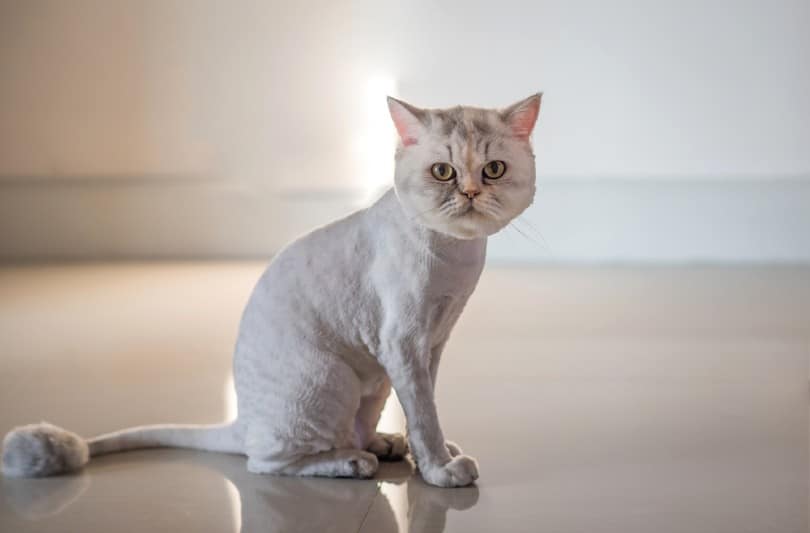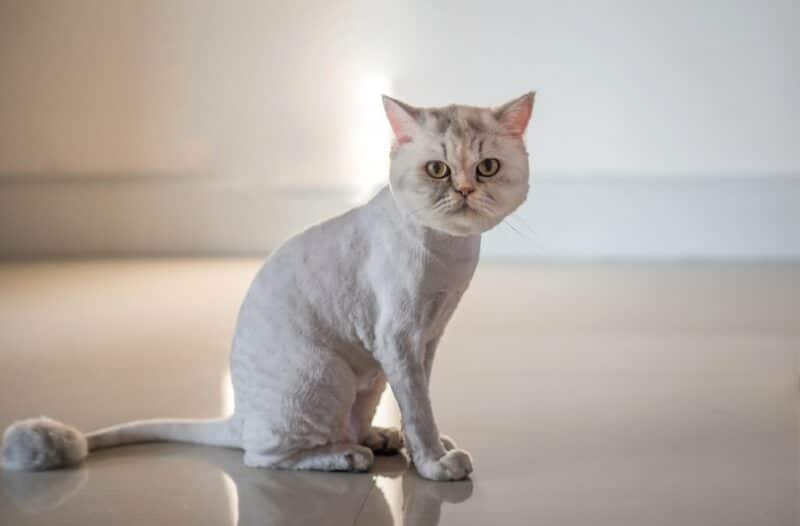While most cats don’t need a haircut, sometimes you might still need to book a trip to the groomer. Getting your cat’s hair cut can reduce matting and hairballs and keep your cat feeling cooler in summer. We’ve rounded up various popular haircuts for cats for you to consider!
Top 7 Cat Haircut Styles
1. Comb Cut
This is the most common haircut for cats and involves trimming a long-haired cat’s coat down to roughly 1 inch in length. This can help reduce matting and decreases the risk of your cat getting hairballs. If your cat has a skin condition, then the comb cut makes it easier to check their skin, give them a medicated bath, and apply any necessary cream or lotion.
2. Belly Shave
This haircut involves clipping the hair on a cat’s belly and between their rear legs. These areas often get uncomfortably matted on long-haired cats. If your cat won’t tolerate regular grooming sessions, it can be easier to take them to a professional groomer, so they can clip their fur for you. Your cat will feel more comfortable as a result!
3. Lion Cut
As one of the most popular novelty cat haircuts, the lion cut works best on long-haired breeds with a profuse coat. It involves trimming the hair off your cat’s body and leaving the hair on their face, legs, and the tip of their tail. This gives your cat the perfect excuse to show everyone that they really are just a little lion! Bear in mind that this cut doesn’t offer your cat many benefits, as it’s just for aesthetics.
4. Hygiene Cut
Some long-haired cats can get matted and dirty hair around their anus, especially if they’re overweight and can’t groom that area easily. This haircut is also sometimes called a sanitary cut. It helps reduce poop and litter getting stuck in your cat’s coat and will keep your cat more comfortable. It’s a good option for senior or overweight short-haired cats with limited mobility as well.
5. Dragon Style
The dragon cut is another purely aesthetic haircut that doesn’t really benefit your cat. This haircut involves clipping most of your cat’s coat away on their body and leaving just a strip down their spine. A talented groomer can then shape this strip into dragon scales. In the winter, this cut will leave your cat feeling pretty cold. We’ve also seen disastrous versions where this has gone wrong, so you’ll definitely need to choose your groomer with care!
6. Ripple Cut
This haircut works better on short-haired cats because it’s easier to see the gradations between each ripple. This is a haircut that’s for aesthetic reasons only, as it won’t help to remove any mats or tangles. It’s important to find an experienced groomer to create this cut, as the lines need to be sharp, which is difficult to achieve on a wiggly cat!
7. Butterfly Cut
This delicate cut needs a careful hand and an experienced groomer. You can choose to cut almost any shape into your cat’s fur and either leave their tail uncut or trimmed into bobbles. This haircut works best on solid-colored cats, as the pattern won’t show up well on cats with multiple colors, like tabbies or Vans.
Always Use a Professional Groomer
Creating a new haircut for your cat isn’t something that we recommend attempting at home. Vets may carry out hygiene or belly shaves if necessary, but most other cuts will need the help of a professional groomer. There are plenty of photos of DIY cat haircuts gone horribly wrong, and your cat will thank you for not adding them to that list!
Bear in mind that your cat’s coat serves a double purpose of keeping them warm in the winter and cool in the summer. So, while you might think that you’re doing your cat a favor by trimming their coat for hot weather, you might be causing them to overheat. If your cat goes outside, you’ll need to monitor their skin for sunburn and perhaps apply a pet-safe sunscreen. In the winter, a clipped coat can leave your cat feeling cold and unable to regulate their body temperature.
That said, cat haircuts for sanitary reasons can help your cat stay cleaner and avoid hairballs. Aesthetic clips are adorable to look at but keep your cat comfortable by making sure they can stay warm (or cool!) enough with their new hairdo.
See also:
- 7 Cat Breeds With Short Ears (With Pictures)
- 8 Cat Breeds That Look Like Tigers & Lions (with Pictures)
Featured Image: Santi Nanta, Shutterstock











